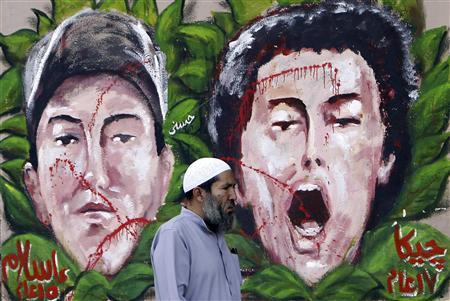Gunmen Wound 9 In Tahrir Square Protest Camp

Nine people were wounded when unknown attackers fired at protesters camping at Tahrir Square in Cairo early Tuesday morning, according to witnesses and Egyptian media, as opponents and supporters of President Mohamed Morsi's constitutional referendum geared up for a day of opposing demonstrations.
Police cars surrounded the square, the first time they had appeared in the area since Nov. 23, the day after a decree by the president giving himself sweeping temporary powers touched off widespread protests.
The attackers also threw firebombs, which started a small fire, witnesses told Reuters. Many of the protesters, awakened by the noise, chanted: "The people want the downfall of the regime." Recorded recitations of the Quran were played over speakers in the square.
Earlier Monday evening, around 100 protesters milled around outside the presidential palace, the BBC reported. It was a focus for earlier opposition demonstrations, and the army has now surrounded it with concrete blocks and tanks.
Leftists, liberals and other opposition groups have called for marches to the presidential palace Tuesday afternoon to protest against the hastily arranged referendum on a new constitution planned for Saturday, which they say is polarizing the country.
Islamists, who dominated the body that drew up the constitution, have urged their followers to turn out "in millions" the same day in a show of support for the president and for a referendum they feel sure of winning and that critics say could put Egypt in a religious straitjacket.
The Salafist Nour Party announced Monday that it would join the pro-Morsi demonstration, Al-Masry al-Youm reported. The Egyptian Students Union, a Muslim Brotherhood affiliate, is also mobilizing.
Brotherhood spokesman Mahmoud Ghozlan told state-run Al-Ahram that participants in the protest had been instructed not to stage sit-ins or to head towards the presidential palace so as to avoid clashes with other protesters.
Seven people were killed and hundreds wounded last week in clashes between the Brotherhood and opponents besieging Morsi's palace.
The elite Republican Guard has yet to use force to keep protesters away from the palace, now ringed with tanks, barbed wire and concrete barricades, but a decree issued by Morsi Sunday night gives the armed forces the power to arrest civilians during the referendum and until the announcement of the results.
Meanwhile, anti-Morsi protesters told The New York Times that his Islamist supporters captured, detained and beat dozens of them last week, holding them for hours with their hands bound on the pavement outside the presidential palace while demanding they confess that they had accepted money to stir violence.
“It was torment for us,” Yehia Negm, 42, a former diplomat with a badly bruised face and rope marks on his wrists, told the Times. He said he was among a group of about 50, including four minors, who were held on the pavement overnight. In front of cameras, “they accused me of being a traitor, or conspiring against the country, of being paid to carry weapons and set fires,” he said. “I thought I would die.”
The abuses have become clear through an accumulation of video footage and victim testimonies, the paper reported. They recall the use of plainclothes thugs by the Mubarak dictatorship.
Judges of Egypt's administrative courts announced Monday that they were conditionally lifting their boycott of running the referendum, Al Jazeera reported. They said their supervision of the process was conditional on bringing an end to the siege of the Supreme Constitutional Court by Morsi's supporters.
In exchange for their supervision, they also demanded assurances that authorities would crack down on vote canvassing outside polling stations and offer life insurance policies to the judges.
On Sunday in a new power play, Morsi issued a new law granting the army all the arrest powers of the police in order to "maintain security and protect vital state institutions" until the vote Saturday. A similar decree passed in June 2012 that gave the military the power to arrest civilians was tossed out within the month after rights activists said it threatened people's rights, Al-Masry Al-Youm reported.
"Despite its limited nature," Egypt News wrote, "the edict will revive memories of Hosni Mubarak's emergency law, also introduced as a temporary expedient, under which military or state security courts tried thousands of political dissidents and Islamist militants."
Voting on the constitutional referendum is to begin Wednesday, when expatriate Egyptians can cast ballots at 150 Egyptian embassies and 11 consulates around the world, Deutsche Presse Agentur reported.
Egyptians in New Zealand would be the first to vote, and Egyptians residing in Los Angeles the last, a diplomatic source said Monday.
The number of Egyptians abroad registered to vote is 586,000.
© Copyright IBTimes 2024. All rights reserved.





















